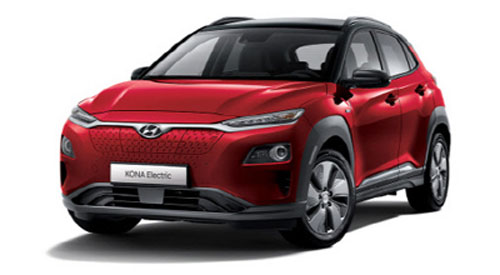Hyundai & Kia Motors to increase EV production three times in three years
Kim Yang Hyuk | mj@ | 2018-05-02 11:34:47

Hyundai's compact SVU electric car 'Kona Electric'. Photo by Hyundai Motors
It is to be a main strategy for quickly preoccupying the future electric car market in the transition period in which the paradigm of automobile technology is changed from an electric locomotive to an electric car. Hyundai Kia Motors set its goal of becoming the world`s second-largest selling green car in 2020.
According to industry sources on May 1, Hyundai & Kia plans to build 15 electric vehicle production systems by the year 2021, including plug-in hybrid cars (PHEV).
The number of electric vehicles produced and sold in the next three years is nearly three times higher than that of the previous year.
Meanwhile, Hyundai is currently selling five electric cars: Ionic Electric, Ionic PHEV, Sonata PHEV, Kona Electric, and Nexon. Kia Motors, on the other hand, possesses three types: Niro PHEV, Soul EV, and K5 PHEV.
The newly added EVs are Hyundai Motor Porter EV, Sonata Subsequent Wagon PHEV (Europe only), and Tucson PHEV. Kia Motors also increased three new models, including the K5 Wagon PHEV (Europe only) and Bongo EV, starting with the NILO EV this year. Genesis is planned to launch the GV80, a sports utility (SUV) electric car, for the first time in the brand.
The electric vehicle production of Hyundai Kia will increase to a maximum of 130,000 units in 2021 with the increase in the electric car product lineup. Hyundai has launched Ionic Electric in 2016 and has built a production system of about 20,000 units along with Kia Motors Soul EV and Ray EV. This year, Kona Electric will be releasing the Nissan EV, which will have a production capacity of 50,000 units. As a result, Hyundai-Kia Automotive is expected to see a significant increase in the percentage of environment-friendly cars produced by its domestic plants. Hyundai Kia currently produces all of its eco-friendly cars at its domestic plants, except for China.
Hyundai`s domestic plant capacity is 1,780,000 units as of 2016, while Kia Motors` sales are 1.6 million units. When Ioniq first launched, the production of electric cars (20,000 units) was only 0.59%. However, it is expected to increase to 3.8% in 2021. Among the 130,000 electric vehicles in 2021, Kona Electric and Niro EVs account for about 40,000 small SUV electric vehicles, accounting for 30.77%.
According to the International Energy Agency, the number of registered electric vehicles worldwide, including PHEV, has already exceeded 2 million units in 2016. IHS Markit, a market research firm, predicts that by 2020 electric vehicle sales will increase to 7.7 million units.
Hyundai and Kia Motors goal to be the world`s second green car company by 2020 sales volume. According to the IHS Markit, Hyundai Kia Motors ranked fourth in sales of green cars for the second consecutive year from 2015 to 2016, however, ranked 11th in the electric car sector.
By Kim Yang Hyuk mj@
